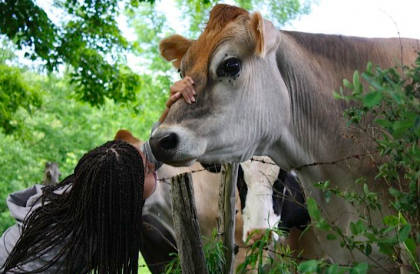John McDaniel is the Program Director at Manhattan Country School Farm, a 180-acre working farm in the Catskill Mountains in upstate New York. It is the farm campus of Manhattan Country School, which is based in New York City. At the MCS Farm, students learn invaluable lessons about community and interdependence, nature and the sustainable production of food, energy and fiber. John's own family, and his experience at the table growing up, inspires his work. Watch the MCS Farm video here.
When did you know that you wanted to work in food?
Honestly, it was never on my radar. I envisioned doing environmental work at some far outpost, but then my environmental classroom became a small working farm. Helping kids make connections between the natural, cultivated, and their own world has become my life's passion. Working with Manhattan Country School students who harvest food from their 180-acre working farm, then pass it immediately from their soil-caked hands to classmates in cooking class who are preparing the meal is magical. However, when we all sit down to eat, it becomes a celebration of community, pride in purposeful work, and an ongoing social institution. This happens not once, but each and every meal through our farm curriculum.
How did you get your current good food job?
My wife Donna became the Manhattan Country School Farm's Cooking Teacher in 1988 and about six months later there was an opening for a Farm Teacher. I held that job for a couple of years before shifting to Nature and Environmental studies and then becoming the Farm Program Director. Like many jobs, we wear many hats. Few careers will see teachers and students feeding, cleaning, and milking cows at daybreak, eating breakfast together, washing dishes side by side, exploring the forest, weaving at a loom, throwing hay bales, shelling beans, sitting quietly by a stream and this happens all before lunch!
How did your previous work or life experience prepare you for a good food job?
Sometime experiences or skill sets skip a generation. In my case, my mom is an incredible cook who had a remarkable talent for stretching a budget. A plentiful and well-balanced meal was always on the table, but it was rarely homegrown. However, my grandfather on my dad's side was an amazing gardener. On a very small plot near his garage he grew his "staples." Tomatoes, beans, potatoes, squash - and my favorite - gourds, which he dried and hung as birdhouses. He also had the most incredible cherry tree outside the kitchen door that, in my memory, never had a bad season. His lessons of building soil, adding manures and fish heads, coffee grounds and egg shells may have skipped my parents, but have come back to nourish me, my family and my students.
What was the greatest obstacle you had to overcome in pursuing your Good Food Job dream?
One obstacle is not spreading the Manhattan Country School Farm program too thin, but at the same time moving organically in directions that will deepen our students' experience. For instance, each spring we make 30 to 40 gallons of maple syrup. We hang and collect sap in a few hundred buckets and boil over a wood arch. It would be very tempting to install pipeline which would allow more trees to be tapped and increase production, but that would remove a direct connection that kids would experience. Another is when we installed our greenhouse. It made sense to optimize the resource and install a large greenhouse near our gardens. In the end, through thoughtful conversation of which students were always involved, we built a smaller greenhouse right off the kitchen. That greenhouse provides classroom space for seeding and transplanting, direct soil to kitchen to meal access for winter salad greens and an extraordinary view through to our meadows and pastures.
What can you identify as the greatest opportunities in food right now?
There is a powerful movement to not just educate children in food systems, but to allow them to get their hands dirty. School and community gardens are sprouting everywhere, which provide the backdrop for kids and adults to work purposefully together. It's truly amazing the conversations that occur when people are performing a sometimes mindless task like weeding. Kids can learn so much about their friends, adults in their life, and most importantly themselves. When kids are given the opportunity and responsibility to care for an animal that will sustain us through milk, meat, eggs, or fiber a transformation occurs. They become educated advocates and stewards by experience. I've heard countless times, from families of my students how the nag factor is shifting. Kids are asking pointed questions about their food sources at meals, becoming informed grocery shoppers, limiting fast food meals and - I think most exciting - nagging to help in the kitchen.
If you could be compensated for your work with something other than money, what would it be?
I would love to see more attention brought to the work that our students are doing at Manhattan Country School Farm. There are some great schools and programs around the country that are educating kids about where their food comes from. I feel the work our kids are doing in tying together the threads of food, fiber, the environment, and equity while never losing sight of issues of social justice is unsurpassed.









